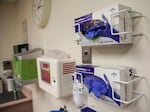Facing a shortage of staff and a surge of critically ill patients, the hospitals in the Portland metro area have shifted into crisis standards of care.
The hospitals include Providence, Legacy Health, Kaiser Permanente and Oregon Health & Science University — which often serve much of the state for critical and specialty care needs.
It’s the first time the metro region’s health system has entered crisis standards of care for adult and pediatric intensive care units since the COVID-19 pandemic began.
Crisis of care standards, as outlined by the state, allow hospitals to stretch resources to address emergencies; for instance, by assigning more patients to each nurse or setting up ICU beds in surgical recovery rooms.
When resources are truly not available to treat everyone, crisis care standards also allow hospitals to triage patients, essentially focusing on treating those with the greatest short-term chance of survival. The four health systems say they are not at the point of triaging patients, and hope to avoid that scenario by adding beds and lowering nurse to patient ratios.
“If we fill all these beds and the volume goes up, that’s probably when we’re going to get there,” said Dr. Melinda Muller, the interim senior vice president and chief medical officer at Legacy Health.
ICU nurses, who often care for a single patient at time, will be assigned two patients, according to Muller. In other units, nurse to patient ratios could increase from 4 to 1 to 5 to 1.

In this file photo, protective gloves and equipment are seen at Legacy's Good Samaritan Hospital in Northwest Portland.
Alan Sylvestre / OPB
Most non-urgent surgeries that require an inpatient hospital stay will be cancelled, Muller said, though hospitals will continue to perform as many outpatient surgeries as possible. Oregon hospital leaders say they’re facing the worst capacity crisis they’ve ever seen, worse even than periods during the pandemic when the number of COVID-19 hospitalizations was higher.
Muller says that without emergency measures, patients with time-sensitive health emergencies — like strokes that require neurosurgery — could be forced to wait too long before getting ICU level care.
In recent days, Muller says, the Portland area ICUs have struggled to admit transfer patients from hospitals in other parts of the state that rely on them to provide care in the most complex cases.
“People were waiting longer than we thought was appropriate, for them to get here, because of the bed capacity issue,” Muller said.
Washington is facing similar capacity issues, limiting Oregon’s ability to weather the crisis by sending patients to neighboring states.
The statewide crisis has been building for months, driven in part by a shortage of clinical staff, particularly nurses. Many have cut back their hours or transferred out of the highest stress bedside roles. And a shortage of long-term care beds for people with chronic conditions or psychiatric illnesses has left many patients stuck in the hospital much longer than necessary.
At the same time, Oregon is facing its first full winter respiratory virus season since dropping the statewide indoor masking policy. A rapid increase in respiratory virus cases in adults — primarily influenza, but also COVID and RSV — is making the situation worse.
State health officials say the number of RSV cases among children has started to stabilize and should continue to fall throughout December, likely easing the strain on pediatric and neonatal care resources.
OHSU’s official respiratory forecast predicts the worst of the surge will be in December, with fewer hospitalizations expected in January.
Only hospitals in Portland have announced a moved to crisis of care standards. Curry Health Network in southwestern Oregon operated under these standards between Nov. 30 and Dec. 5.
Correction: This story has been corrected to reflect that all of Legacy Health’s hospitals have entered crisis standards of care for adults. An earlier version incorrectly referred to Legacy Emmanuel instead of Legacy Health.